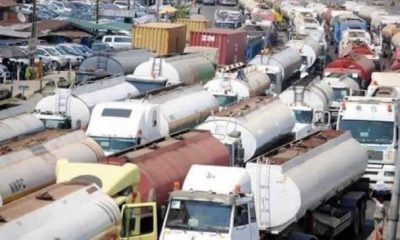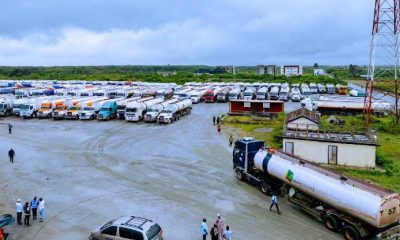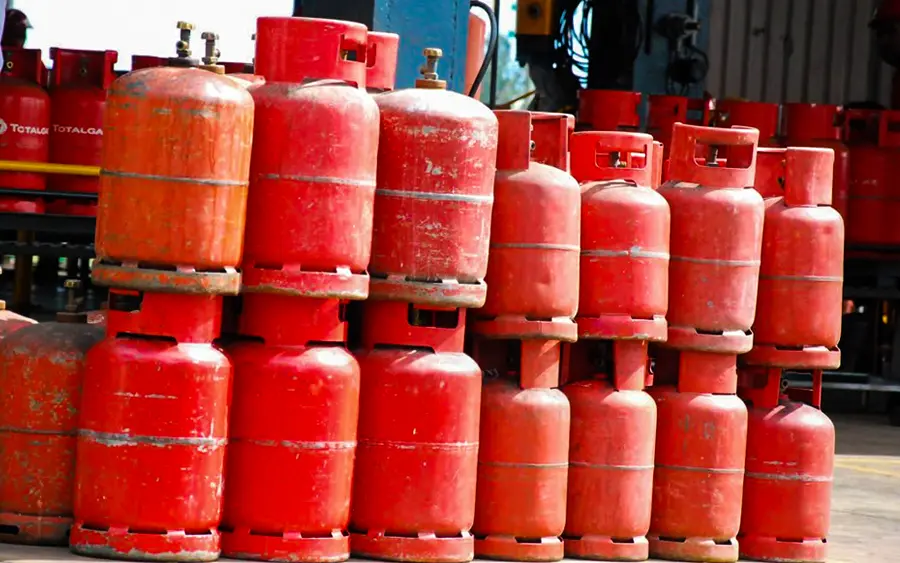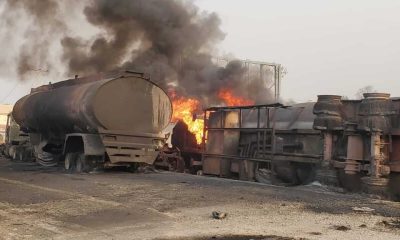Headlines
Fuel Scarcity in Nigeria Worsens as Petrol Hits N1,000 per Litre Amid Long Queues

In what has become one of the most severe fuel crises in recent memory, Nigerians across major cities are grappling with the dire consequences of a nationwide scarcity of Premium Motor Spirit (PMS), commonly known as petrol.
The fuel shortage, which began as a ripple effect of President Bola Tinubu’s announcement to remove fuel subsidies on May 29, 2023, has now escalated into a full-blown crisis, leaving motorists stranded and commuters desperate, EKO HOT BLOG observed.
The Federal Capital Territory (FCT), Lagos, Kaduna, Kano, Port Harcourt, and several other states have been hit hardest, with long queues stretching for kilometers at the few filling stations still operating.
In some areas, petrol prices have surged to over N1,000 per litre, as the black market thrives amidst the chaos.
The ripple effects have been swift and severe—public transportation fares have doubled, businesses have slowed, and the daily lives of millions of Nigerians have been thrown into disarray.

The crisis began on May 29, 2023, when President Bola Tinubu, in his inaugural address, announced the removal of the long-standing fuel subsidy.
This decision, aimed at economic reform, has instead plunged Nigeria into one of its worst fuel crises in recent history. Since that fateful day, the situation has deteriorated rapidly, spreading across the nation like wildfire, and leaving a trail of despair in its wake.
EDITOR’S PICKS
- Midnight Fire Destroys Multi-Million Naira Goods in Anambra Market
- Poland Tightens Student Visa Rules Amid Scandal Over System Abuse
- FG Mandates Submission of Matriculation Lists to Combat Fake Degrees
In Abuja, the Federal Capital Territory, where the crisis first reared its head, the scarcity of Premium Motor Spirit (PMS), commonly known as petrol, has reached unprecedented levels.
Long queues at filling stations stretch for kilometers, with desperate motorists paying exorbitant prices just to keep their vehicles running. On the black market, a 10-litre container of petrol sells for as much as N12,000, while private filling stations charge between N700 and N1,050 per litre. 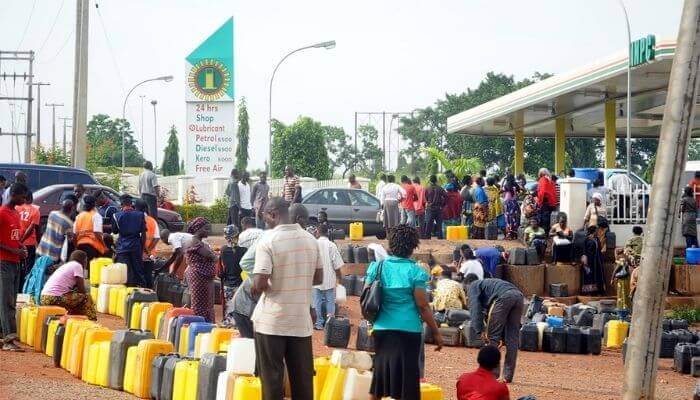
The few NNPC mega stations that still operate sell at the official price of N617, but with lines so long, many give up hope of ever getting to the pump.
The effects of this scarcity are not limited to Abuja. In Lagos, Nigeria’s commercial capital, the situation is equally dire.
Major filling stations are either shut down or overwhelmed by the sheer number of vehicles and jerry-can-bearing buyers.
On Awolowo Road in Ikoyi, motorists wait for hours at the two NNPC mega stations, causing traffic chaos on what is usually a bustling thoroughfare.
The story is the same across the city, from Ikeja to Surulere, with frustrated drivers and commuters grappling with skyrocketing transport fares and gridlock.
Kaduna, Kano, Port Harcourt, and other cities across the nation are not spared. In Kaduna, petrol prices have soared to as high as N950 per litre at some stations, with transport fares doubling as a result.
In Kano, motorists face similar challenges, with prices ranging from N750 to N1,000 per litre, depending on the location.
Meanwhile, in Port Harcourt, the price of petrol has surged to between N870 and N900 per litre, with long queues at the few stations still selling the product.
The Nigerian National Petroleum Company Limited (NNPCL), the sole importer of petrol in the country, has attributed the crisis to “distribution challenges,” but the specifics of these challenges remain unclear.
The company has denied allegations of indebtedness to international oil traders and failure to remit revenues to the Federation Account, but these denials have done little to alleviate the suffering of ordinary Nigerians.
The president of the Independent Petroleum Marketers Association of Nigeria (IPMAN), Abubakar Maigandi, has blamed the situation on panic buying and the recent protests that disrupted depot operations.
FURTHER READING
- Tinubu Approves Reconstruction Of Wagga Bridge Linking Adamawa, Borno
- Police Name Suspect Behind Hotel Presidential Dynamite Blast
- Mother, Five Children Die After Eating Local Delicacy In Kano
However, he admitted that even he was unsure of the root cause, as NNPCL had not provided clear answers.
As the crisis drags on, the effects on the economy and daily life are becoming more severe.
Businesses are struggling to keep their doors open, with transportation costs eating into profits.
The average Nigerian, already burdened by inflation and economic hardship, now faces the added challenge of securing fuel for their vehicles and generators, with no end in sight.
For many, the fuel crisis is a stark reminder of the deep-rooted challenges facing Nigeria. The removal of the fuel subsidy, intended as a step towards economic stability, has instead exposed the vulnerabilities in the nation’s supply chain and infrastructure.
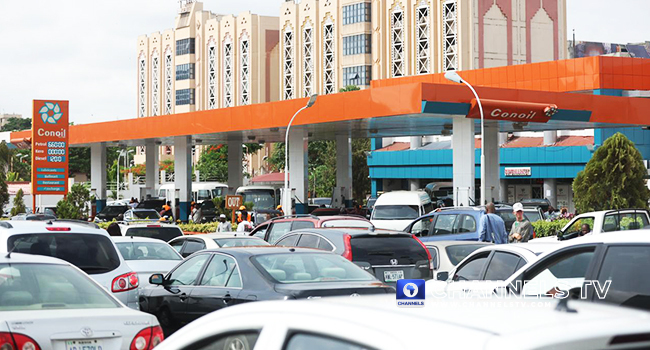
As the country waits for a resolution, the question on everyone’s mind is: How long can Nigeria remain stranded?
Some motorists and commuters have expressed their frustration amid the ongoing fuel crisis.
“I’ve been at this filling station since 4 a.m., and it’s already 10 a.m. now. I still haven’t gotten fuel,” lamented Adeola Olatunji, a frustrated Lagos-based taxi driver.
“How are we supposed to survive like this? The government needs to bring back the subsidy. We can’t afford these prices.”
“This is unbearable,” said Musa Bello, a commercial bus driver in Kaduna.
“The prices are killing us, and our passengers are suffering too. Every day, we’re losing money because we can’t get enough fuel. Tinubu must rethink this policy; it’s causing too much hardship.”
“I had to pay N2,000 just to get from one end of town to the other,” complained Blessing Okoro, a university student in Port Harcourt.
“As students, we’re barely managing to survive. The removal of the subsidy has made everything more expensive. The President needs to listen to the people and do what’s right.”
“The queues are getting longer, and people are getting more desperate,” noted Chukwudi Eze, a civil servant in Abuja.
“We’ve never had it this bad. We elected Tinubu to make our lives better, not worse. He needs to reverse this decision before it breaks the country.”
“I had to close my shop early today because I couldn’t find fuel for my generator,” said Fatima Ahmed, a small business owner in Kano.
“If this continues, many of us will be out of business. The President must act fast and bring back the subsidy. The common people are suffering the most.”
In the coming days, as NNPCL works to resolve the “evacuation challenges” and restore normalcy, Nigerians will be watching closely.
For now, the nation remains on edge, with fuel scarcity casting a long shadow over the future.
Click here to watch our video of the week:
Advertise or Publish a Story on EkoHot Blog:
Kindly contact us at ekohotblog@gmail.com. Breaking stories should be sent to the above email and substantiated with pictorial evidence.
Citizen journalists will receive a token as data incentive.
Call or Whatsapp: 0803 561 7233, 0703 414 5611


